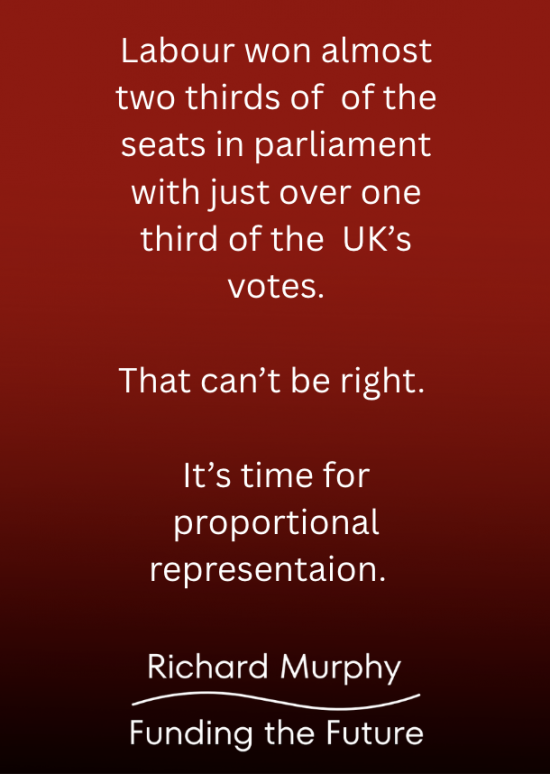
Thanks for reading this post.
You can share this post on social media of your choice by clicking these icons:
There are links to this blog's glossary in the above post that explain technical terms used in it. Follow them for more explanations.
You can subscribe to this blog's daily email here.
And if you would like to support this blog you can, here:


 Buy me a coffee!
Buy me a coffee!

Depending on the system maybe every vote counts, no more wasted votes in constituencies, maybe more chance of voting for something policy wise rather than picking the least worst option. One can hope lol
Agreed.
But I’m being slightly picky.
Total registered vote, 48,208,507.
Turnout was 59.7%, 28,924,725.
Didn’t vote 40.3%, 19,283,782.
Of the turnout, Labour got 9,708,716 votes.
Didn’t vote got 9,575,066 more than Labour — or almost double.
Of the total vote, Labour got 20.14% (rounded up). About one in five.
Labour got two thirds of the seats in Parliament.
End result = Total failure of First Past The Post to provide a government that can claim that it legitimately represents the people.
But it has been this way for a long time.
It is time for PR.
Agreed
Any form of PR will be a major improvement.
I think the UK is too large for single party, national lists (works in the Netherlands) so some form of constituency-system would no doubt be preferable.
Netherlands is unique that it does so. It works as a single constituency where the threshold is 5%. A voter has a choice of about 500 candidates. Scaled up to the size of the UK, that would mean something like 2000 candidates to choose from. Each candidate is on the same balot and each voter gets the same balot. The Dutch system can’t handle a large population size like the UK.
Definitely not!
The German system (and the similar New Zealand system) have both local MPs (elected by FPTP) and a national list for each party, which is used to balance the parliament to reflect the electorate’s party preferences (given on a separate part of the ballot paper). I like that system because it provides very accurate Proportional Representation whilst still preserving the idea of small constituencies and local MPs. And very literally, every vote counts. (Being picky, I would prefer that local MPs were selected by ranked preference, but that’s gilding the lily.)
https://en.wikipedia.org/wiki/Electoral_system_of_Germany
https://en.wikipedia.org/wiki/Ranked_voting
I accept that I’m in a minority here, where most people seem to favour large multi-member constituencies similar to how we did EU elections. Frankly, who cares, as long as we pick something better than the current system!
http://www.lder.org/the-change-we-need
I stand proudly with the 40.3%.
At the last vote (only local), I turned up to spoil my vote. There was no-one I felt I could vote for – but I felt bad about “not voting”.
Maybe the biggest benefit of a decent PR system will be to make voting meaningful…. And encourage better behaviour from both voters and the voted?
The LibDem attempt in 2010 offered a badly thought out version of P/R. A simple, easy to understand and implement one might be more difficult for today’s Dominic Cummings to oppose. Ranked choices seems to me to be the best candidate, but how Constituencies were reorganised to provide sufficient area and numbers of voters to ‘smooth out’ the worst regional anomalies is, in my mind, still an issue to be addressed.
We need multi-member constituency STV to get something that approximates to democracy.
It’s been time for some form of PR for all my adult life, and demonstrably since the 1983 election where the SDP came within a smidge of out polling Labour with 25.4% of the vote. Had they managed to out poll Labour I think there would have had to be change. But, in the end, they got less than 4% of the seats, leading to the destruction of the party. It was clear that FPTP was grossly unfair. Politics has been a s**t show (at least) since then.
If you think about it, if labour were the progressive party they claim to be, they wouldn’t hesitate to replace the awful FPTP system with some form of PR.
FPTP is so obviously blatantly unfair and undemocratic as most voters don’t get an MP they voted for, and you get parliamentary majorities such as labour’s current one with a fraction of the electorate.
Additionally, it has historically given the right power 2/3 of the time, with results we all know too well about. So, why the reluctance on labour’s part?
Peter Kellner’s recent posts on SubStack, Peter’s SubStack, are well worth reading on this subject.